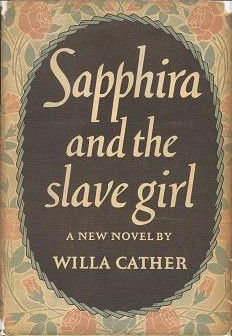Plot summary
Except for the epilogue, the book takes place entirely in 1856.
Sapphira Colbert is an unhappy middle-aged woman, crippled by dropsy, who came to marriage late and married beneath her station. Her husband, Henry, a miller, lives an entirely separate life, residing at his mill and visiting the estate house only for occasional meals. Sapphira is comfortable with slavery; Henry is not.
Having overheard a conversation between two of her slaves, Sapphira develops a paranoid fear that Henry is having an affair with an attractive young mulatto girl named Nancy. Sapphira responds by mistreating Nancy. Eventually Sapphira invites a dissolute nephew to the estate, who threatens to rape Nancy on several occasions.
With the help of the Colberts' daughter, Rachel Colbert Blake, and two abolitionist neighbors, Nancy is helped to make connections with the Underground Railroad and taken to Canada.
The epilogue takes place 25 years later. Nancy, now in her 40s, returns to Virginia to visit her mother, and Mrs. Blake. The narrator (Cather) [2] is revealed to be a child who has heard stories of Nancy's escape all of her life.
This page is based on this
Wikipedia article Text is available under the
CC BY-SA 4.0 license; additional terms may apply.
Images, videos and audio are available under their respective licenses.
